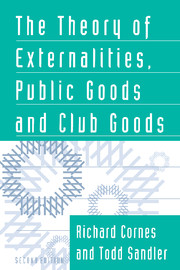Book contents
- Frontmatter
- Contents
- List of tables and figures
- Preface
- Part I Introduction to the theory of externalities, public goods, and club goods
- Part II Externalities
- Part III Public goods
- 6 Pure public goods: Nash-Cournot equilibria and Pareto optimality
- 7 Alternative mechanisms for provision of public goods
- 8 Public goods in general
- 9 Game theory and public goods
- 10 Departures from Nash-Cournot behavior
- Part IV Clubs and club goods
- Part V Applications and future directions
- References
- Author index
- Subject index
9 - Game theory and public goods
Published online by Cambridge University Press: 05 June 2012
- Frontmatter
- Contents
- List of tables and figures
- Preface
- Part I Introduction to the theory of externalities, public goods, and club goods
- Part II Externalities
- Part III Public goods
- 6 Pure public goods: Nash-Cournot equilibria and Pareto optimality
- 7 Alternative mechanisms for provision of public goods
- 8 Public goods in general
- 9 Game theory and public goods
- 10 Departures from Nash-Cournot behavior
- Part IV Clubs and club goods
- Part V Applications and future directions
- References
- Author index
- Subject index
Summary
Externalities and public goods clearly involve interdependencies among individuals in an essential way. The net benefits to an individual that will result from a given course of action will depend crucially on the consumption, production, or subscription choices of others. So too, in general, will the individual's optimal choice. Thus, in the standard public goods problem, interdependence concerns payoffs and strategic choices. Choices are interdependent because a person's best strategy may hinge on the strategies of others. This suggests an important role for game theory in analyzing such models. Indeed, gametheoretic concepts have implicitly and explicitly been used at various places in our discussion. A primary purpose of this chapter is to explore the game-theoretic structure of public goods models more explicitly and systematically. Our intent is to keep the analysis somewhat informal so as to appeal to a wide audience, while accurately illustrating crucial concepts and features of modern game theory.
In the development of game theory since the appearance of The Theory of Games and Economic Behavior, by von Neumann and Morgenstern (1944), it has proved helpful to categorize games into two types: cooperative and noncooperative. Those in which agents, or players, are able to communicate with one another and make binding agreements to act in certain ways are cooperative games, and those that do not allow such opportunities are noncooperative games. Cooperative games tend to focus on the formation of coalitions and the stability of these coalition structures, whereas noncooperative games concentrate on the individual agent's choices.
- Type
- Chapter
- Information
- The Theory of Externalities, Public Goods, and Club Goods , pp. 300 - 326Publisher: Cambridge University PressPrint publication year: 1996



